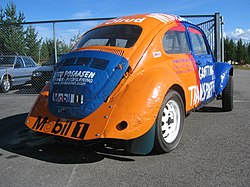Folkrace
The examples and perspective in this article may not represent a worldwide view of the subject. (April 2010) |
Folk racing or folkrace (Finnish: jokamiesluokka; Swedish: folkrace; Latvian: folkreiss; Danish: folkeræs; Norwegian: bilcross) is a popular, inexpensive, and entry-level form of Nordic rallycross that originally comes from Finland, where it is also called jokkis or Jokamiehenluokka (everyman's class).
About[]



The races are run on special gravel or tarmac tracks, 2,400 metres (1.5 mi) in length.[1] The tracks are designed to limit the top speed to 80 km/h (50 mph), but on most of the tracks speeds of over 120 kilometres per hour (75 mph) can be reached. The competitions are divided into different classes depending on age and gender. Participants can be as young as 14 years of age.
The race is divided into different heats with usually 6 cars. The driver winning a race is awarded seven points, second five points, third four points and so on. When all the heats have been driven, the total score is calculated[clarification needed] and the top six drivers get to race in the A final, the next six in the B final and so on. The winner of the A final wins the event.
To maintain its inexpensive nature, there is a rule on car costs. The races are run in standard cars, but participants are generally free to choose as long as they meet certain minimum safety regulations. In Finland, the cars must not be all-wheel drive and cannot have a diesel engine and they have to be made of family cars (no mid-engine layout and minimum of 4 seats). Anyone can place a fixed-price bid on any car, and the buyer is then chosen by draw. The fixed price is € 1,500 (Finland, ca. US$1,650) or 8,000 SEK (Sweden, ca. US$1,000). Refusing to sell is grounds for having one's competition license revoked; however, participants with handicaps can get an exemption if they need special equipment in the cars. Personal equipment such as the seat and safety harness are not included in the sale. This type of system eliminates the motivation for sinking extensive amounts of work and money into a folk racing car.
Because old road cars are used up in folk racing, retro and antique car enthusiasts talk about "the folk racing death": Folk racing does away with many cars that are too old to be considered usable for everyday driving but too new to have reached the status of a "veteran" or "antique".
Folk racing is a full-contact sport like banger racing. While collisions do happen and cars make contact with each other, intentionally ramming or obstructing a competitor is forbidden, and the safety rules are strict, so that teenagers (15 to 17 years old) and drivers without a regular driver's license may participate.
See also[]
References[]
- ^ "International Report". epub.performanceracing.com. 31 Jan 2017. Retrieved 21 Feb 2017.
External links[]
- Video: Jeremy Clarkson & Folk Racing in Finland
- Bilcross.no - norwegian bilcross
- Ola's Bilsport Sida
- Eriks folkracesida
- https://web.archive.org/web/20060112183055/http://www.sbf.se/info/folkrace
- FIA Finland Folk Racing
- Photo gallery
- Folkrace in Latvia
Resources[]
| Wikimedia Commons has media related to Folkrace. |
- Auto racing by type
- Motorsport in Finland
- Motorsport in Sweden
- Rallycross